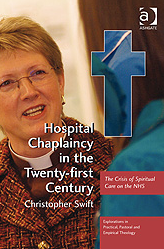Hospital Chaplaincy in the Twenty–first Century
Patchy update of a fascinating book which gives little insight into the rise of Free Church and multi-faith chaplaincies
 Hospital Chaplaincy in the Twenty–first Century
Hospital Chaplaincy in the Twenty–first Century
Christopher Swift
Ashgate 2014
ISBN: 978-0-7546-6416-1
Reviewer: Derek Fraser
This is a fascinating book which was first published in 2009 and as such, it was really attractive since it was written by a serving chaplain about the challenges and dilemmas of work within the NHS.
In the past few years there has been significant change in the NHS which has been connected with major shifts occurring in chaplaincy as a profession. The growing professional confidence accompanied by a greater self understanding and clear identity has meant that traditional perceptions have given way to some robust understandings of the role and profession.
This book provides a valuable insight into the opportunities and difficulties in 21st century chaplaincy. It is worth reading and most especially by those who have little or no grasp of this field. It deserves to be required reading for all those entering the profession not least for the early chapters which set the historical context of the work.
The early chapters provide a comprehensive picture of chaplaincy in its historical context in England. Chapters 3 & 4 chronicle chaplaincy development under New Labour and the Battle of Worcester, which should be required reading for all in chaplaincy and the church responsible for it. This is a careful presentation of issues relating political issues to the professional agenda. His work is insightful and cognisant of the various forces working in these agendas.
This book has now been revised and printed in paperback form which is its key and perhaps only asset. The updating process of the book is rather sketchy and appears to be in the form of minor tweaks. While it is supposed to be about chaplaincy in the UK it is almost exclusively is centred on England and is very biased towards Anglicanism. In that respect it is quite blinkered and gives little insight into the rise of Free Church chaplaincy and the corresponding decline of Co E Clergy, coupled with the rise of multi-faith chaplaincies.
One of the main drivers of new innovations in chaplaincy in the last five years have come from Scotland where some very creative work has been undertaken and none of those developments are documented which means the story is lacking its current feel.
The literature of chaplaincy has been enhanced by some sound work in Scotland and yet prominence is given to Cobb’s edited volume because of its world wide contributors. Minor gripes would include the awareness that beyond Cardiff and Leeds there are post graduate courses in chaplaincy at Cambridge and Glasgow. There is little or no mention of developments in N Ireland and Wales and so the picture is significantly incomplete in terms of UK chaplaincy.
The theory sections of the book are quite disconnected from the first part of the book and have a different feel with a more technical and academic dimension to them. The use of an ethnographic paradigm did not resonate in the same way as previous chapters. Only three texts are used to illustrate the work of a chaplain and these are limited to exclusively religious activities which are very disappointing since it reinforces a preconception of chaplaincy which is still rooted in a religious modality.
Little or no account is taken of pastoral reflective practice that has been part of mental health chaplaincy for a long time. It was introduced into the acute sector from Cambridge and has been widely embraced within Scotland as values based reflective practice. I did not warm to the ethnographic approach which at times was straining in its academic derivation. While such an approach is valid in its own right, it did not seem to convey as easily as the previous sections the thrust of the argument and seems even more disconnected from the practice of chaplaincy in the modern day.
It is disappointing that such an opportunity to bring the chaplaincy story up to date is missed. It serves to tell the story up to 2009 in a credible way but little beyond that time frame.
The Revd Dr Derek J Fraser is Lead Chaplain at Cambridge University Hospital, and Chair of UK Board for Healthcare Chaplaincy
Baptist Times, 25/09/2014